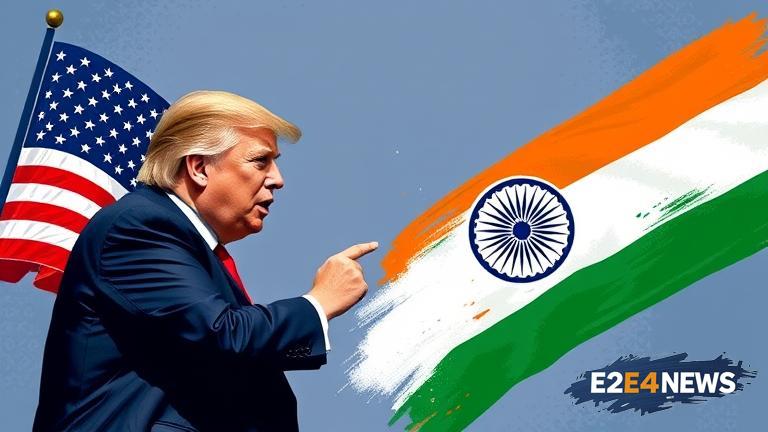The United States and India have been engaged in a trade dispute for several years, with the US imposing tariffs on Indian goods and India retaliating with its own tariffs on US products. The trade tensions between the two countries have been escalating, with the US President Donald Trump repeatedly targeting India over trade issues. One of the main flashpoints behind the trade tensions is the trade deficit between the two countries. The US has been running a trade deficit with India, which means that the US imports more goods from India than it exports to the country. The trade deficit has been a major concern for the Trump administration, which has been seeking to reduce the deficit through tariffs and other trade restrictions. Another key flashpoint is the issue of tariffs. The US has imposed tariffs on several Indian goods, including steel and aluminum, in an effort to protect American industries. India has retaliated by imposing its own tariffs on US goods, including agricultural products and chemicals. The tariffs have had a significant impact on trade between the two countries, with both sides suffering losses. The issue of intellectual property rights is also a major flashpoint between the two countries. The US has been critical of India’s intellectual property laws, which it says do not provide adequate protection for American companies. India has been working to strengthen its intellectual property laws, but the US remains unsatisfied. The trade tensions between the US and India have also been affected by the issue of market access. The US has been seeking greater access to the Indian market, particularly in the areas of agriculture and pharmaceuticals. However, India has been resistant to opening up its market to US companies, citing concerns about the impact on domestic industries. The US has also been critical of India’s data localization policies, which require foreign companies to store data within India. The US says that these policies are discriminatory and will harm American companies. India has defended its data localization policies, saying that they are necessary to protect the country’s data sovereignty. The trade tensions between the US and India have significant implications for both countries. The US is one of India’s largest trading partners, and the trade dispute has had a major impact on Indian exports. India is also a significant market for US companies, and the trade tensions have made it more difficult for them to operate in the country. The trade dispute has also had a broader impact on the global economy, with other countries watching the developments closely. The US and India have been engaged in talks to resolve the trade dispute, but so far, there has been little progress. The US has been seeking a comprehensive trade agreement with India, but India has been resistant to such an agreement. The trade tensions between the US and India are likely to continue, with both sides dug in on their positions. The dispute has significant implications for the future of trade between the two countries, and it remains to be seen how it will be resolved. The US-India trade relationship is complex and multifaceted, and the trade tensions are just one aspect of the broader relationship between the two countries. The US and India have a long history of cooperation on a range of issues, including defense and security. However, the trade dispute has put a strain on the relationship, and it remains to be seen how it will be resolved. The trade tensions between the US and India have also been affected by domestic politics in both countries. In the US, the trade dispute has been driven in part by the Trump administration’s ‘America First’ policy, which seeks to protect American industries and jobs. In India, the trade dispute has been driven in part by the government’s efforts to protect domestic industries and promote economic development. The trade dispute has significant implications for the future of trade between the US and India, and it remains to be seen how it will be resolved.





